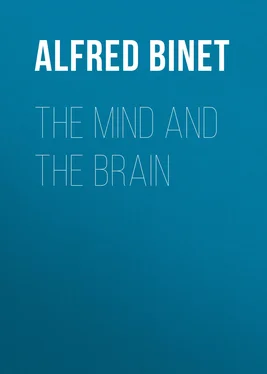Alfred Binet - The Mind and the Brain
Здесь есть возможность читать онлайн «Alfred Binet - The Mind and the Brain» — ознакомительный отрывок электронной книги совершенно бесплатно, а после прочтения отрывка купить полную версию. В некоторых случаях можно слушать аудио, скачать через торрент в формате fb2 и присутствует краткое содержание. Жанр: foreign_prose, foreign_religion, Философия, foreign_psychology, foreign_antique, на английском языке. Описание произведения, (предисловие) а так же отзывы посетителей доступны на портале библиотеки ЛибКат.
- Название:The Mind and the Brain
- Автор:
- Жанр:
- Год:неизвестен
- ISBN:нет данных
- Рейтинг книги:4 / 5. Голосов: 1
-
Избранное:Добавить в избранное
- Отзывы:
-
Ваша оценка:
- 80
- 1
- 2
- 3
- 4
- 5
The Mind and the Brain: краткое содержание, описание и аннотация
Предлагаем к чтению аннотацию, описание, краткое содержание или предисловие (зависит от того, что написал сам автор книги «The Mind and the Brain»). Если вы не нашли необходимую информацию о книге — напишите в комментариях, мы постараемся отыскать её.
The Mind and the Brain — читать онлайн ознакомительный отрывок
Ниже представлен текст книги, разбитый по страницам. Система сохранения места последней прочитанной страницы, позволяет с удобством читать онлайн бесплатно книгу «The Mind and the Brain», без необходимости каждый раз заново искать на чём Вы остановились. Поставьте закладку, и сможете в любой момент перейти на страницу, на которой закончили чтение.
Интервал:
Закладка:
On thinking it over, it will be found that this contains a very great mystery, for this power of distinction ( specificité ) of our nerves is not connected with any detail observable in their structure. It is very probably the receiving centres which are specific. It is owing to them and to their mechanism that we ought to feel, from the same excitant, a sensation of sound or one of colour, that is to say, impressions which appear, when compared, as the most different in the world. Now, so far as we can make out, the histological structure of our auditory centre is the same as that of our visual centre. Both are a collection of cells diverse in form, multipolar, and maintained by a conjunctive pellicule ( stroma ). The structure of the fibres and cells varies slightly in the motor and sensory regions, but no means have yet been discovered of perceiving a settled difference between the nerve-cells of the optic centre and those of the auditory centre. There should be a difference, as our mind demands it; but our eye fails to note it.
Let us suppose, however, that to-morrow, or several centuries hence, an improved technique should show us a material difference between the visual and the auditory neurone. There is no absurdity in this supposition; it is a possible discovery, since it is of the order of material facts. Such a discovery, however, would lead us very far, for what terribly complicates this problem is that we cannot directly know the structure of our nervous system. Though close to us, though, so to speak, inside us, it is not known to us otherwise than is the object we hold in our hands, the ground we tread, or the landscape which forms our horizon.
For us it is but a sensation, a real sensation when we observe it in the dissection of an animal, or the autopsy of one of our own kind; an imaginary and transposed sensation, when we are studying anatomy by means of an anatomical chart; but still a sensation. It is by the intermediary of our nervous system that we have to perceive and imagine what a nervous system is like; consequently we are ignorant as to the modification impressed on our perceptions and imaginations by this intermediary, the nature of which we are unable to grasp.
Therefore, when we attempt to understand the inmost nature of the outer world, we stand before it as before absolute darkness. There probably exists in nature, outside of ourselves, neither colour, odour, force, resistance, space, nor anything that we know as sensation. Light is produced by the excitement of the optic nerve, and it shines only in our brain; as to the excitement itself, there is nothing to prove that it is luminous; outside of us is profound darkness, or even worse, since darkness is the correlation of light. In the same way, all the sonorous excitements which assail us, the creakings of machines, the sounds of nature, the words and cries of our fellows are produced by excitements of our acoustic nerve; it is in our brain that noise is produced, outside there reigns a dead silence. The same may be said of all our other senses.
Not one of our senses, absolutely none, is the revealer of external reality. From this point of view there is no higher and no lower sense. The sensations of sight, apparently so objective and so searching, no more take us out of ourselves than do the sensations of taste which are localised in the tongue.
In short, our nervous system, which enables us to communicate with objects, prevents us, on the other hand, from knowing their nature. It is an organ of relation with the outer world; it is also, for us, a cause of isolation. We never go outside ourselves. We are walled in. And all we can say of matter and of the outer world is, that it is revealed to us solely by the sensations it affords us, that it is the unknown cause of our sensations, the inaccessible excitant of our organs of the senses, and that the ideas we are able to form as to the nature and the properties of that excitant, are necessarily derived from our sensations, and are subjective to the same degree as those sensations themselves.
But we must make haste to add that this point of view is the one which is reached when we regard the relations of sensation with its unknown cause the great X of matter. 7 7 See p. 18 , sup .—Ed.
Positive science and practical life do not take for an objective this relation of sensation with the Unknowable; they leave this to metaphysics. They distribute themselves over the study of sensation and examine the reciprocal relations of sensations with sensations. Those last, condemned as misleading appearances when we seek in them the expression of the Unknowable, lose this illusory character when we consider them in their reciprocal relations. Then they constitute for us reality, the whole of reality and the only object of human knowledge. The world is but an assembly of present, past, and possible sensations; the affair of science is to analyse and co-ordinate them by separating their accidental from their constant relations.
CHAPTER III
THE MECHANICAL THEORIES OF MATTER ARE ONLY SYMBOLS
If we keep firmly in mind the preceding conclusion—a conclusion which is neither exclusively my own, nor very new—we shall find a certain satisfaction in watching the discussions of physicists on the essence of matter, on the nature of force and of energy, and on the relations of ponderable and imponderable matter. We all know how hot is the fight raging on this question. At the present time it is increasing in intensity, in consequence of the disturbance imported into existing theories by the new discoveries of radio-activity. 8 8 I would draw attention to a recent volume by Gustave Le Bon, on Evolution de la Matière , a work full of original and bold ideas.
We psychologists can look on very calmly at these discussions, with that selfish pleasure we unavowedly feel when we see people fighting while ourselves safe from knocks. We have, in fact, the feeling that, come what may from the discussions on the essence of matter, there can be no going beyond the truth that matter is an excitant of our nervous system, and is only known in connection with, the perception we have of this last.
If we open a work on physics or physiology we shall note with astonishment how the above considerations are misunderstood. Observers of nature who seek, and rightly, to give the maximum of exactness to their observations, show that they are obsessed by one constant prejudice: they mistrust sensation.
A great part of their efforts consists, by what they say, in reducing the rôle of sensation to its fitting part in science; and the invention of mechanical aids to observation is constantly held up as a means of remedying the imperfection of our senses. In physics the thermometer replaces the sensation of heat that our skin—our hand, for example—experiences by the measurable elevation of a column of mercury, and the scale-pan of a precise balance takes the place of the vague sensation of trifling weights; in physiology a registering apparatus replaces the sensation of the pulse which the doctor feels with the end of his forefinger by a line on paper traced with indelible ink, of which the duration and the intensity, as well as the varied combinations of these two elements, can be measured line by line.
Learned men who pride themselves on their philosophical attainments vaunt in very eloquent words the superiority of the physical instrument over mere sensation. Evidently, however, the earnestness of this eulogy leads them astray. The most perfect registering apparatus must, in the long-run, after its most scientific operations, address itself to our senses and produce in us some small sensation. The reading of the height reached by the column of mercury in a thermometer when heated is accomplished by a visual sensation, and it is by the sight that the movements of the balance are controlled; and that the traces of the sphygmograph are analysed. We may readily admit to physicists and physiologists all the advantages of these apparatus. This is not the question. It simply proves that there are sensations and sensations, and that certain of these are better and more precise than others. The visual sensation of relation in space seems to be par excellence the scientific sensation which it is sought to substitute for all the rest. But, after all, it is but a sensation.
Читать дальшеИнтервал:
Закладка:
Похожие книги на «The Mind and the Brain»
Представляем Вашему вниманию похожие книги на «The Mind and the Brain» списком для выбора. Мы отобрали схожую по названию и смыслу литературу в надежде предоставить читателям больше вариантов отыскать новые, интересные, ещё непрочитанные произведения.
Обсуждение, отзывы о книге «The Mind and the Brain» и просто собственные мнения читателей. Оставьте ваши комментарии, напишите, что Вы думаете о произведении, его смысле или главных героях. Укажите что конкретно понравилось, а что нет, и почему Вы так считаете.












